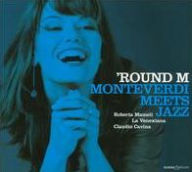'Round M: Monteverdi Meets Jazz Roberta Mameli Primary Artist
by Roberta Mameli
2020-05-08 04:19:07
'Round M: Monteverdi Meets Jazz Roberta Mameli Primary Artist
by Roberta Mameli
2020-05-08 04:19:07
Taken literally, the slyly clever title {|'Round M|} is a pretty accurate description of this album because it includes not only four madrigals by {|Monteverdi|}, but pieces by three contemporaries who worked around him in much the same style and aes...
Read more
Taken literally, the slyly clever title {|'Round M|} is a pretty accurate description of this album because it includes not only four madrigals by {|Monteverdi|}, but pieces by three contemporaries who worked around him in much the same style and aesthetic. There is also one piece by contemporary composer {|Antonio Eros Negri|}, an elaboration of Lamento della ninfa, one of Monteverdi's most famous works, which is included on the album. Also included is {|Giovanni Felice Sances|}' Usurpator tiranno, which has an almost identical ground bass as Lamento della ninfa, and is melodically awfully close as well. It makes for a Ninfa-heavy album, but Monteverdi's original and the two other pieces are so appealing that listeners may not object at all. Claudio Cavina and his ensemble {|La Venexiana|} have irreproachable credentials as Monteverdi experts. Their recordings of the complete Books of Madrigals and the operas Orfeo and Poppea set the standard for technically impeccable, intelligently informed, and devastatingly expressive performances, so when they set their hands to introducing jazz elements into the composer's music, listeners can be confident that they are not approaching it casually or with any lack of respect. One might not agree with all their decisions (the tone of the saxophone is so guttural and grainy that it clashes with the refined sound of the core ensemble, for instance), but it's clear that these treatments were arrived at thoughtfully. The outstanding soprano Roberta Mameli, who was featured on many of La Venexiana's albums, is equally in her element in the freedom she brings to these performances. Her tone, piercingly pure but full-bodied, and her easy feel for jazz immediately command attention and sometimes amazement. Teatro d'Amore, a 2009 album of Monteverdi madrigals featuring {|Christina Pluhar|} and {|L'Arpeggiata|}, brought a similar jazz feel to several of its tracks, including Ohimè ch'io cado. Counter tenor {|Philippe Jaroussky|}'s riff on it from that album is closely mirrored by Mameli's and Cavina's, but its jaunty walking bass and eccentric vocal line practically cry out for a loosely jazzy interpretation and might easily have inspired similar versions; besides, both performances are terrific. Listeners who enjoy one of these albums (which have three madrigals in common) are likely to also enjoy the other. Glossa's sound is characteristically exceptional: immaculate and vividly present.
Less








.jpg)
















.EBOOK COVER.jpg)
.jpg)


